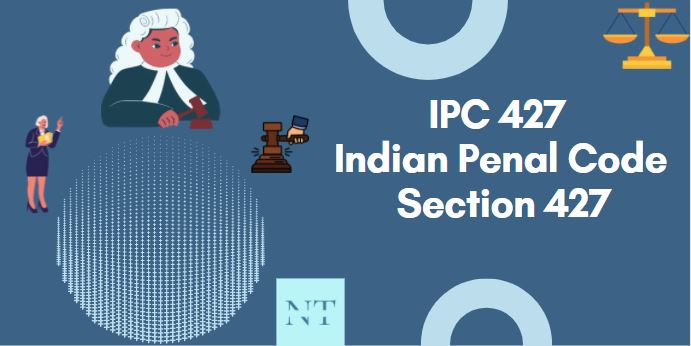IPC 427: Many a times people who are not happy about decisions or events that perspire can lead to grudges and the act of revenge if commence which may not be as sever as murder but it does have its own damages done to the accused. This act of revenge is termed as misdemeanour or mischief by the court of law and is stated to penalise the perpetrator of the act. Minor crimes like damaging a field by releasing cattles in the area is also a violation and is punishable by the court of law under Indian Penal Code Section-427.
Table of Contents
What is the Meaning of Mischief in The Eyes of Law Under Indian Penal Code Section-427?
Any act that is intentionally done to result in loss or damage to any commodity with a valuation that amounts to fifty rupees or more is termed as misconduct and mischief.
| Indian Penal Code | Section-427 |
| Is the offense Cognizable? | No, It is a non cognizable offence |
| Is the offense bailable? | Yes, it is a bailable offense |
| Penalty | Two years imprisonment, fine or both |
| The nature of the offense | Mischievous acts that causes damages or loss to another |
| Criteria | The damaged should be valued at INR fifty or above |
The Indian Penal Code Section-427
Indian Penal Code Section-427 states that, if any individual commits or does mischievous acts through which he/she intends to cause loss or damage to any commodity or property of a holder which equates to a sum of INR 50 Rupees or more is liable to be punished under the court of law with a penalty that may extend upto two consecutive years or with a fine and in some cases both. An act carried out by any individual which includes destruction of property, diminishing the value of the same is liable to be punished by the court of law. Regardless of the act committed may not result in any loss or damages to the owner of the property, just having merely the intention or knowing that such action would cause injury to a person or their property may attract a violation under Indian Penal Code Section-427 by the court of law.
For example, If any individual assaults a cab driver and wrecks his/her car in a minor dispute he/she therefore, damages the property and is liable to get penalised by the court of law under Indian Penal Code Section-427.
Which means he/she will be liable to a penalty for two years of imprisonment and/or fine decided by the jury.

Object and Caution
Section 427 -A Indian Penal Code was introduced to put a stop at the daily mischief that is intended to harm or destroy someone else’s property.
Who May File a Complaint?
The grievance under Indian Penal SectionSection-427 may be honed by someone who’s property may have been compromised by another person which lead to his incurring loss, damage or devaluation of a property as a result related to the action.
Important Aspects
There are certain aspects that need to be met for an accused to be determined as a violator of the law under the Indian Penal Code Section-427.
- The Individual should have a proper knowledge about the events and the intention of the act committed.
- The accused should have incurred wrongful damage or loss to the accuser.
Examples of Violation of IPC 427
- If a person throws a diamond ring in the river that belongs to another person then the first person has committed a violation under Indian Penal Code Section-427.
- If a person destroys property documents of another person then the first person is liable to be punished by the court of law under Indian Penal Code Section-427
Analysis Of Indian Penal Code Section-427
- Accuser: This section stresses on the grounds of the accuser incurring laws due to mischievous action carried out by the accuser. He/She should have incurred a loss of possession that amounts to or exceeds the sum of INR fifty rupees.
- The culprit should have caused damage to the accuser’s property with an intention or knowledge that the property would be damaged therefore, losing its value and jeopardizing safety and creating discomfort in the area where the crime was situated.
- The most important point at issue: The knowledge of the accuser and the intention to damage a property that does not belong to him/her incurring loss to the victim and devaluating the asset is the main grounds where the accuser will be punishable by the court of law under Indian Penal Code Section- 427.
- What is the term “Mischief” in the context: Mischief is an act carried out by an individual having an intent or plotting in their mind that the act may result in loss or damage to any individual or the public which includes destruction of a property or any such change in the condition of the property which is destroyed or diminished and causes devaluation of the same.
What are The Stages of Crime As Per The Indian Penal Code ?
There are four stages of crime acknowledged in India. These stages should be existing in any occurence or act to be justified as a crime.
Stage i. The initial stage is the The Mental Stage: Small disputes among two individuals would encourage them to destroy each other’s properties as a form of expression of anger.At this stage the thought process of the Individuals would be of making them pay for their dispute.
Stage ii. The secondary stage is Preparing for the crime: At this stage the individuals in dispute would be thinking of ways to harm each other directly or indirectly. At this point is the deciding factor when they could transit to some other sections but if they choose to destroy commodities that they have then the incident would escalate to Indian Penal Code Section-427.
Stage iii. The third stage is Attempting to execute a crime: At this point both the participants should have decided to destroy properties or commodities that they possess and as they look for an easy access to their personal properties respectively, they must go forward to destroy or damage the property.
Stage iv. The last stage is the result of the crime: If the damage is done and the resulting outcome amounts to an amount greater than a total sum of INR Fifty Rupees, then they are liable to pay a penalty depending upon the severity of the damage and/or serve two years or more.
Nature of Offense Under IPC 427
The offense filed under a case registered with the Indian Penal Code Section-427 is a non-cognizable case which refers to the fact that if a person is filed under this section the police authorities can go ahead and arrest the individual without the need of issuing a warrant.
Any offense under the Indian Penal Code Section-427 is bailable in nature and the offender can be released by bail. The case filed under Indian Penal Code Section-427 is liable to be investigated and evaluated by any magistrate or the magistrate that governs and has the authority over the area of the place where the crime was committed.
Frequently Asked Questions
Is Indian Penal Code Section-427 a non-cognizable or cognizable violation of the law?
Yes, Indian Penal Code Section-427 is a non-cognizable offense which means that the police authorities do not require an arrest warrant to apprehend the offender and can immediately take him in custody for interrogation and further investigation of the matter.
What is the penalty for a case filed under Indian Penal Code Section-427?
The penalty for a case registered under the Indian Penal Code Section-427 could be imprisonment for a term of two consecutive years or fine decided by the authorities at the jury and sometimes a convict can get charged with even both.
Which is the court that conducts trial of a case filed under Indian Penal Code Section-427?
Indian Penal Code Section-427 can be conducted in the court of any magistrate but a court at the area of the incident is recommended as to not stretch or prolong the whole case.
What is the Indian Penal Code?
Indian Penal Code generally means the Criminal Code of India, it is to cover all aspects of criminal law. It was commenced on the first of January of the year 1862 it is a manuscript that consists of all the possible crimes that may have happened or will happen in the society. This code applies to any offense committed by an Indian on an Indian ground registership or aircraft with reasonable penalties as a form of punishment. The Indian Penal code was adopted by Pakistan and Bangladesh as they were also a part of British India and also as the British authorities operated in countries like Malaysia, Sri Lanka and Singapore, Most of the codes are identical to the Indian Penal Code.
Penal Codes are a crucial set of regulations imposed on the citizens of a constitution to promote a peaceful neighbourhood diminishing and minding every negative aspect that would lead up to a dysfunctional society.
Suggested Reading:
| Go To Sundarban News Today’s Home Page | Click Here |
| Go To India Code’s Page | Click Here |
| Article Category | Legal Guide |
